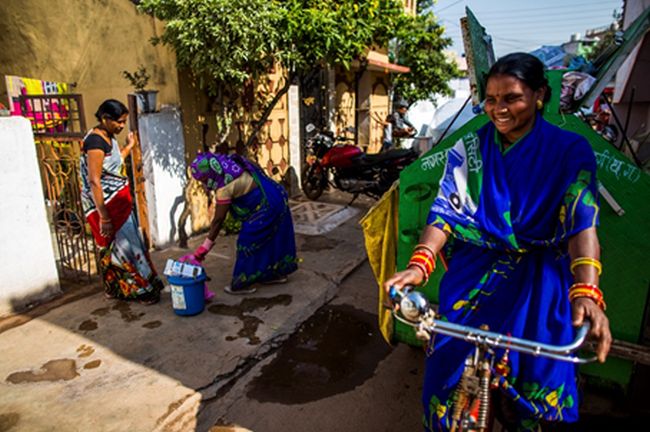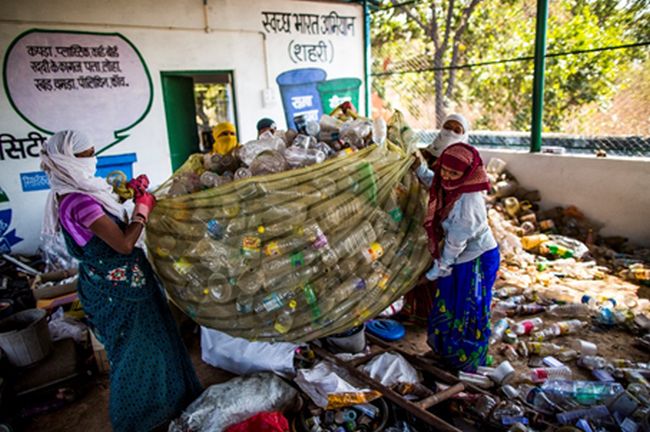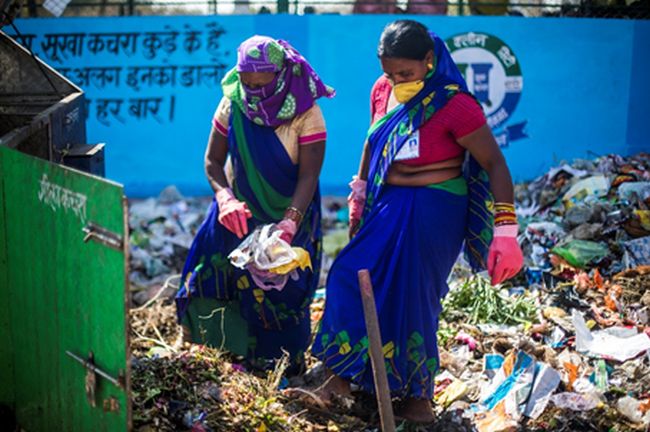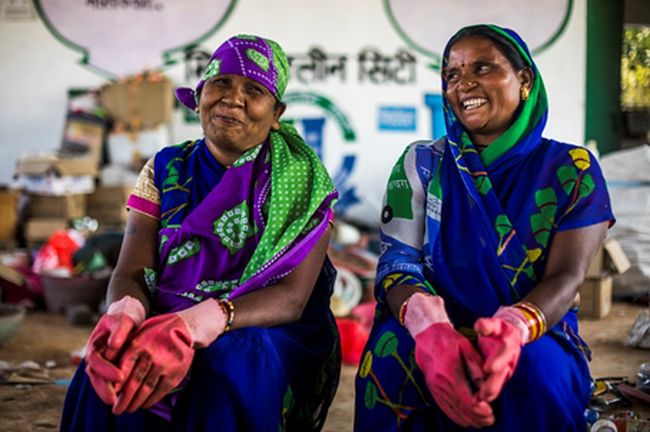New Delhi: This International Women’s Day, here is a tale of two friends who are setting a benchmark in an unusual way – as professional women waste collectors. They collect, segregate and dispose of household waste with clockwork precision. Meet Dulari and Sushma, both in their mid-40s live in a semi-urban slum in Durg district of Chhattisgarh. Both women have journeyed the typical ups and downs of life. As single parents they both struggled to make ends meet for their family’s needs by doing odd jobs, mostly as labourers at construction sites. But in the past few years they have peddled their way on a path that has not only broken barriers but also given them the security of a fixed income, raised their confidence and given them a voice that today they have become change agents to emulate – all by taking care of the tedious task of collecting household waste.
Whistling through community ward 14 in the semi-urban slum of Durg district in Chhattisgarh, Dulari and Sushma begin their day at 07:00 AM sharp. While Dulari cycles through the slum spread across 2 square kilometres, Sushma walks with her and collects the garbage from each house.
I learnt how to cycle when I joined this work of Solid and Liquid Waste Management (SLWM). When I joined almost a year ago, it was scary to ride the cycle with a huge carrier on the back. Also, there were many animals like cows and dogs that would come in the way. This would scare me and my cycle would wobble and I would lose control many a times. But now, I cycle confidently and make my way through the community, shares 52-year-old Dulari.

Sushma collects waste from each house, as Dulari pulls the heavy garbage collection bin on her cycle
Considering the growing need of waste management, over a year ago, the local municipality cooperation of Durg joined hands with WaterAid India for technical support. The common ideology of the three aimed at protecting the ecosystems, inform and educate communities in need, and enable people to prosper across the world.

The women work together to segregate garbage in specific categories, such as plastic bottles, medicine covers, plastics, and so on, at the SLWM centre in Durg
In 2017, over 50 women from 21 wards in Durg district came together to address the problem of waste disposal and management in their respective wards. These women, active members from several self-help groups, earlier worked as daily wage labourers or domestic helps. Dulari and Sushma stepped up for the cause along with their other friends from the self-help group.
Even though it has merely been a year since the work of waste segregation began, Dulari and Sushma claim that the people’s behaviour has changed immensely.
Earlier all the people would just give us waste in a black polythene bag. Our work would double as we had to first segregate wet and dry waste, and then classify the waste in sub categories like medicine bottles, plastics, old shoes, and so on. It took way more time and effort in the entire process, recalls Dulari.

The community members are now aware of the ways in which they should segregate waste; and if not, Sushma reminds them resolutely
After a number of awareness drives for the community members, as well as training sessions for the women, the concept of segregation of wet and dry waste was introduced with a much greater impact. The municipality cooperation distributed green and blue garbage bins across the community. With repeated efforts and exchange of dialogue, the community began to dispose garbage in dry and wet form, separately.
From 07:00AM till 11:00AM, these women collect dry and wet waste from each household, post which they help with the waste segregation process until 03:00 PM.
In ward 14, there are a total of 600 houses. As it is difficult to visit each of the 600 houses everyday, we have split our work. We collect the garbage from 300 houses on alternate days. The days are fixed and so the community members know the days allotted to them. The community has become so sensitive now that even if we are unable to go to their lane due to some reason, they themselves come to this SLWM centre and throw the waste, claims Sushma.

Dulari and Sushma sift through the waste collected wearing appropriate gear to protect them from infections and diseases
Yet, waste segregation is not an easy task. The women are vulnerable to various diseases and health hazards, and so proper medical check-ups are conducted from time to time. Also, the women are provided with safety clothing such as gloves and masks. They are trained on ways to keep themselves protected from various infections as well. If one of them forgets to wash their hands after working or wear a mask, there are others who keep reminding in order to maintain proper hygiene practices.
Dulari and I have known each other for the last 25 years now. We worked together as labourers at construction sites. We are happy to work here at the solid liquid waste management centre now as all these women are our friends, so it feels safe, and most of all it feels good to work towards a specific goal that benefits us and the environment as well, shared Sushma proudly.
The best part of our work is that we have learnt so much to keep the environment clean. People in big cities still know about all this information, but nobody ever informed us about the importance of waste segregation. Even my family now disposes the waste in two separate dustbins, claims Sushma.
Sushma and Dulari are an amazing example of never giving up. Their resilience and commitment to their work is inspiring. Nothing deters them – be it the scorching heat, an occasional flat tyre, or even the struggle they’ve faced in their personal lives – these women get to work with a beaming smile, every day! With such dedicated efforts, household waste collection and disposal in a proper manner – a huge issue that the country is now facing – is being carried out with clockwork precision in their ward. They now stand as live examples for other wards and communities across Durg district.
Images Courtesy: WaterAid/ Prashanth Vishwanathan
Disclaimer: The opinions expressed within this article are the personal opinions of the author. The facts and opinions appearing in the article do not reflect the views of NDTV and NDTV does not assume any responsibility or liability for the same.































